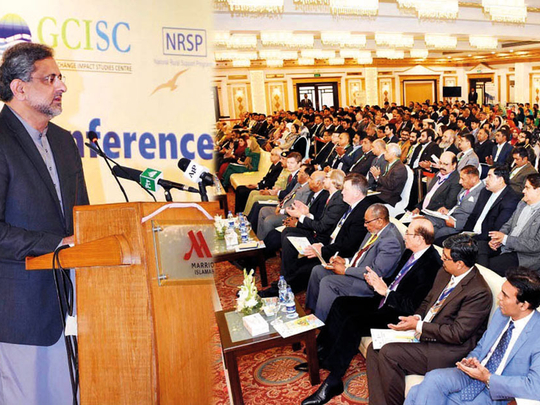
Islamabad: Pakistan is committed to playing its role in global efforts for tackling climate change by adopting climate friendly-policies and meeting its international commitments, Prime Minister Shahid Khaqan Abbasi has affirmed.
The prime minister was addressing the ‘Science Policy Conference on Climate Change’ in Islamabad (December 18-20) which aims to bridge the gap between scientists and policymakers.
The conference was organised by Ministry of Climate Change’s research wing, the Global Change Impact Studies Centre (GCISC), in collaboration with University of Utah, USA, Higher Education Commission, US-Pakistan Centre for Advanced Studies in Water, Mehran University of Engineering and Technology Jamshoro and others.
Speaking at the gathering, Premier Abbasi said that Pakistan government has allocated more than 8 per cent of the budget for climate-related actions and has passed the Pakistan Climate Change Act and set up two new institutions — the National Climate Change Council (NCCC) and the National Climate Change Authority.
The new climate friendly policies and intuitions corroborate that climate change is among the top priorities for the government of Pakistan.
Pakistan’s current share of global carbon output is less than one per cent as 50 per cent of primary energy comes from gas and another 20 per cent from hydropower and other renewable resources.
Speaking on the occasion, Federal Minister for Climate Change Mushahidullah Khan said the government aims to strengthen Pakistan’s research capacity in climate change.
Pakistan has taken a number of significant steps towards climate-friendly development, including ratification of Paris agreement, passing of Climate Change Act and National Forest Policy, the launch of Green Pakistan program to preserve forestry and wildlife in Pakistan and declaration of Astola Island as Pakistan’s first Marine Protected Area, he informed.
Despite these heartening initiatives by the government, Pakistan is consistently among the top ten countries most affected by climate change. In the last 20 years, Pakistanis have witnessed devastating floods, recurrent heatwaves, prolonged drought, erratic rainfall leading to lowered agricultural productivity and threat of desertification.
To discuss the current and future climate variability, extreme events, and the implications for sustainable development, the first-of-a-kind science conference was held in Islamabad which attracted more than 140 scientists from all over the world and hundreds of policymakers and students.
Prominent speakers at the conference were Prof Steve Burian of the US, Dr Tom Downing of the UK, Dr Youba Sokona of Mali, and Dr Adil Najam, the former vice-chancellor of LUMS.
“We are now living in the era of adaptation. Climate change is reality,” asserted renowned academician Dr Adil Najam. However, instead of focusing on risks posed by climate variability, Dr Najam urged Pakistan to tap into immense opportunities provided by a changing climate such as technological transformation, electric vehicles and renewable energy.
GCISC’s Executive Director Dr Tariq Banuri stressed that, “We have to learn to survive and prosper in a world defined by climate change” because it is not a future challenge, it is happening now and affecting the whole world.
The conference, he said, offered an opportunity for stakeholders to deliberate on Pakistan’s development in the context of climate change. It is aimed at improving scientific understanding of changing climate and associated impacts on socioeconomic sectors as well as develop policy recommendations to address climate change challenges affecting Pakistan, Dr Banuri said.
“The conference not only provided students a chance to connect with international scholars and learn about latest research methods but also opened my eyes new ideas,” Kamran Khan, a student of NUST, told Gulf News.
Major themes of the conference included Glaciers Response to Climate Change, Climate Change and Food Security, Climate Change Trends in Pakistan, Climate Change, Vulnerable Ecosystems and Biodiversity, Climate and Disaster Preparedness, Climate Mitigation and Adaption, Climate Change and Water Security and Climate Change Policy, Governance and Conflict.












